Fred MacMurray, Billy Wilder and lust
Quer você queira ou não, um ator ou atriz desenvolve uma persona – especialmente nos dias do sistema de estúdio – para ser facilmente reconhecido pelo público e também para que o estúdio o utilize em papéis estereotipados. Isso aconteceu com Fred MacMurray, mais conhecido por interpretar caras bacanas pais de família, pais que tinham resposta para tudo e que poderiam ser ao mesmo tempo um pouco atrapalhados e muito sábios. Mas ele não fazia estes papéis quando trabalhava com Billy Wilder.
Whether
you want it or not, a performer usually develops a persona – especially in the
Studio System days – in order to be easily recognizable by the public and also
typecasted by the studio. This happened to Fred MacMurray, better known as a
lovely guy, a family man, a dad who knew it all and who could be at the same
time a bit clumsy and very wise. But he didn't play by these rules when he was
working with Billy Wilder.
Billy
Wilder desafiou os limites de MacMurray e tirou tudo de pior que existe na
mente humana para encher seus personagens de ambição e luxúria – e, assim,
Wilder dirigiu MacMurray nas duas melhores performances da carreira do ator, em
que ele fez papéis muito diferentes dos habituais e, ironicamente, estas são as
performances pelas quais MacMurray é mais conhecido hoje.
Billy
Wilder went wild (LOL) with MacMurray, and took the worst he could have in his
mind in order to infuse his characters with ambition and lust – and, by doing
this, Wilder directed MacMurray in the two best performances of his career, in
which he played against type and, ironically, these are the performances that
today he has the biggest chance to be recognized for.
“Pacto
de Sangue” (1944) é um dos melhores filmes noir de todos os tempos. Nele, Fred MacMurray
é Walter Neff, o perfeito panaca que é seduzido pela femme fatale Phyllis
Dietrichson (Barbara Stanwyck) e convencido a fazer parte do plano para matar o
marido dela e ficar com o dinheiro do seguro. Obviamente, Walter não é um
completo imbecil. Ele tem boa memória e boa atenção aos detalhes, habilidades
que são importantes para o crime.
“Double
Indemnity” (1944) is one of the best film noir of all time. In it, Fred
MacMurray is Walter Neff, the perfect stupid man who is dragged down by femme
fatale Phyllis Dietrichson (Barbara Stanwyck) and convinced to take part in her
plan to kill her husband and get the insurance money. Of course, Walter is not
totally idiot. He has a good memory and pays a lot of attention to detail, skills
that are important for the crime.
Walter
é movido por luxúria, por seu desejo sexual por Phyllis e periodicamente impedido
de continuar por causa de sua amizade com Barton Keyes (Edward G. Robinson) –
ou talvez haja também luxúria envolvida, porque algumas teorias apontam para um
subtexto homossexual no filme. Só depende da maneira como cada pessoa
interpreta o filme.
Walter is
moved by lust, by his sexual desire for Phyllis and periodically stopped by his
friendship with Barton Keyes (Edward G. Robinson) – or maybe there is also lust
involved here, because some theories point at a gay subtext in the movie. It
only depends on how each person interprets the movie.
Em
1943, Barbara Stanwyck era a atriz mais bem paga de Hollywood, e Fred MacMurray
era o ator mais bem pago. Entretanto, foi coincidência que eles tenham se
juntado para fazer “Pacto de Sangue”. Ambos estavam relutantes no início.
Stanwyck foi facilmente convencida por Wilder a aceitar o papel, quando ele
disse a ela para ser ousada, mas a história com MacMurray foi outra. Walter
Neff era um anti-herói, e o papel já havia sido recusado por grandes atores
como James Cagney, Spencer Tracy e Alan Ladd. Até o próprio MacMurray recusou o
papel, dizendo que ele não era capaz de fazê-lo, mas Wilder insistiu, dia após
dia, até que o ator se rendeu. No começo, MacMurray disse para Wilder: “Você
está cometendo o maior erro da sua vida!”, e no fim, confessou: “Eu jamais
sonharia que aquele seria o melhor filme que eu faria”.
In 1943,
Barbara Stanwyck was the highest paid actress in Hollywood and Fred MacMurray,
the highest-paid actor. It was, however, a coincidence that they ended up doing
“Double Indemnity”. Both were reluctant at first. Stanwyck was easily convinced
by Wilder, who told her to be fearless, but it was another thing with
MacMurray. Walter Neff was an anti-hero and the role was refused by A-listers
like James Cagney, Spencer Tracy and Alan Ladd. Even MacMurray himself turned
down the role, saying he couldn’t do it, but Wilder insisted, day after day,
until the actor compromised. At first, MacMurray said to Wilder: “You’re making
the mistake of your life!”, and in end, he confessed: “I never dreamed it would
be the best picture I ever made”.
MacMurray
voltou a trabalhar com Wilder 16 anos depois. Na época, ele já era um favorito
na Disney, tendo feito alguns filmes fofos para a família no estúdio do Mickey.
O ano era 1960 e o filme era “Se Meu Apartamento Falasse”. Fred MacMurray
interpretava Sheldrake, o chefe de C.C. Baxter (Jack Lemmon). Sheldrake usa o
apartamento de seu empregado para ter encontros sexuais com outras mulheres sem
correr o risco de ser descoberto pela esposa. A presa atual é Fran Kubelik
(Shirley MacLaine), que é ascensorista no prédio de Sheldrake. Mais uma vez, o
personagem de MacMurray é movido pela luxúria.
MacMurray
reteamed with Wilder 16 years later. By then, MacMurray was already a Disney
favorite, having made some cute family flicks for the Mickey Mouse studio. The
year was 1960 and the film was “The Apartment”. Fred MacMurray played
Sheldrake, C.C. Baxter's (Jack Lemmon) boss. Sheldrake uses his employee's
apartment to have sexual encounters with other women far from his wife. The
current prey is Fran Kubelik (Shirley MacLaine), who is an elevator operator at
Sheldrake's building. Once again, MacMurray's character is drove by lust.
Sheldrake
é simplesmente nojento – provavelmente o personagem menos simpático que
MacMurray interpretou em toda sua carreira. Além de trair a esposa e enganar a
senhorita Kubelik, ele também cria uma situação difícil para Baxter. E
Sheldrake simplesmente não se importa. Ele quer ter prazer e evitar problemas. Quando
a senhorita Kubelik para de lhe proporcionar prazer e se torna um problema, ele
simplesmente a dispensa, e não se importa se isso for colocar a vida dela em
perigo.
Sheldrake
is simply disgusting – probably the least likeable character MacMurray ever played.
Besides cheating on his wife and making empty promises to Miss Kubelik, he also
creates a difficult situation for Baxter. And Sheldrake simply doesn’t care. He
wants to have pleasure and avoid problems. When Miss Kubelik stops giving him
pleasure and becomes a problem, he simply dumps her, and doesn’t even care if
this puts her life in danger.
Convenhamos:
se refletirmos sobre a maioria dos outros personagens de MacMurray, nos
perguntamos como eles podem sequer transar. Quer dizer, em “Bon Voyage, Enfim
Paris!”, ele tem dois filhos, mas é tão ingênuo e atrapalhado que se perde no
esgoto parisiense. Em “Quando o Coração não Envelhece” (1967), ele é um pai
trapalhão que tem um jacaré de estimação chamado George. Em outros filmes da
Disney, como “O Fantástico Super-Homem” (1961) e “Nunca é Tarde para Amar” (1966), ele começa o filme como um cara solteiro, e depois de um namoro
atrapalhado e fofo, acaba casado. O MacMurray da Disney não conhece luxúria –
por isso ele é aceito pela Disney, e por isso ele não é tão interessante quanto
o MacMurray de Billy Wilder.
Let's face
it: if we think about most of MacMurray's characters, we ask ourselves how they
could even get laid. I mean, in “Bon Voyage” (1962), he has two children, but
is so naïve and absent-minded that he gets lost in the Parisian sewer. In “The
Happiest Millionaire” (1967), he is a goofy father who has a pet alligator
called George. In other Disney films, like “The Absent-Minded Professor” (1961)
and “Follow Me, Boys!” (1966), he starts the movie as a single man, and after a
sweet but clumsy dating process, he ends up married. The Disney MacMurray has
no lust – that's why he is accepted by Disney, and that's why he is not as
interesting as the Billy Wilder MacMurray.
Billy
Wilder e Fred MacMurray poderiam ter feito outro filme juntos. O ator foi um
dos nomes considerado para o papel de Joe Gillis em “Crepúsculo dos Deuses”
(1950), mas todos nós sabemos que William Holden foi escalado em seu lugar.
Gillis é outro personagem que se deixa levar pela luxúria, e eu penso que
MacMurray teria sido um ótimo Gillis. Mesmo sem este filme na parceria, nós não
podemos negar que MacMurray nunca esteve tão bem quanto ao lado de Billy
Wilder.
Billy
Wilder and Fred MacMurray could have done another film together. The actor was
considered for the role of Joe Gillis in “Sunset Boulevard” (1950), but we all
know William Holden was cast instead. Gillis is another character very much
driven by lust, and I imagine MacMurray would have played a great Gillis. Even
without this movie in their partnership, we can’t deny that MacMurray did his
best when he went a little Wilder.
This is my
contribution to the Fred MacMurray blogathon, hosted by Laura at Phyllis Loves Classic Movies.
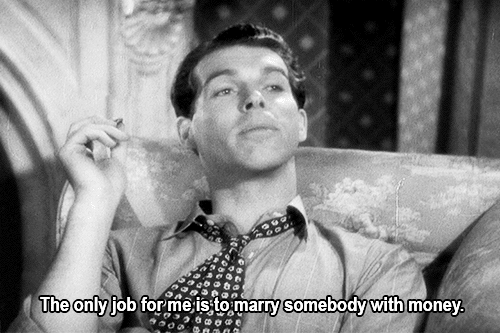
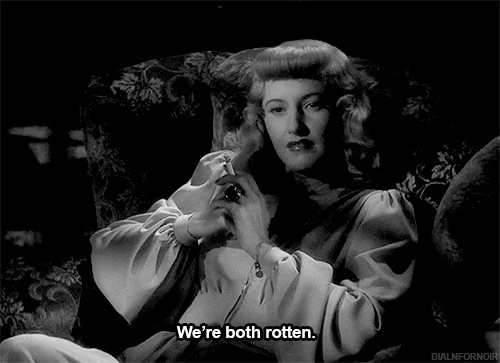
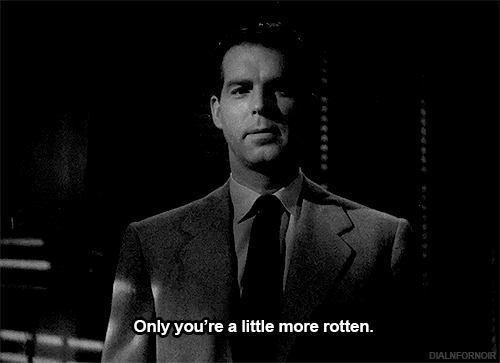
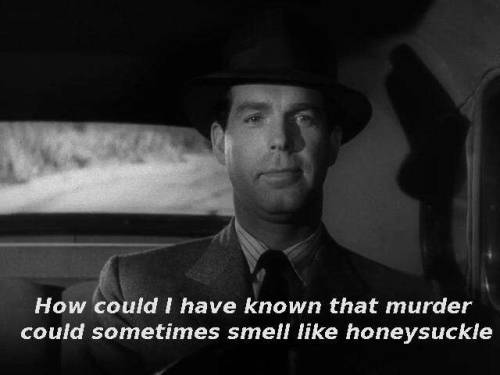
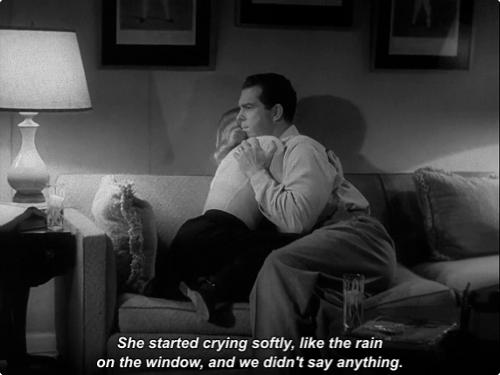




5 comments:
I enjoyed reading this evaluation of the two collaborations. The shock for people caught up in the Disney or TV image of MacMurray is an extra layer to his performances for Wilder. It is not necessary for the roles to work, but it adds interest.
Yeah, I have zero interest in the Disney MacMurray; I haven't seen nearly enough of MY THREE SONS to gauge that properly; and his early comedies are fun to watch but still kinda shallow. DI and APARTMENT are MacMurray at his absolute best and it's a shame he didn't make more movies in this vein.
Brilliant topic for this blogathon. I hadn't thought of MacMurray's characters in this way before, especially in the hands of Billy Wilder. You've given me a new angle for the next time I see "Double Indemnity" or "The Apartment".
I'm really not a fan of MacMurray but I loved your article nevertheless. I think you captured perfectly the aura of the character he plays in Wilder's films.
Hi greatt reading your post
Post a Comment